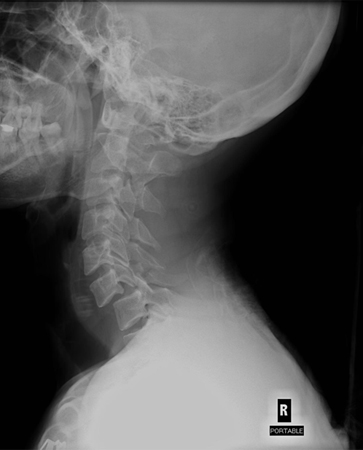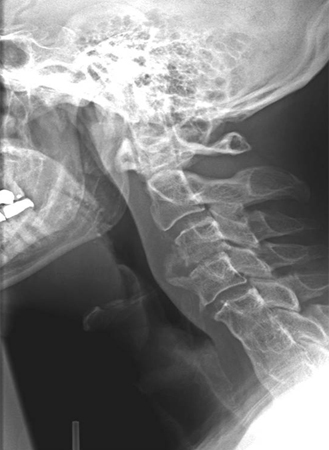Differentials
Common
Osteoarthritis
History
acute or chronic neck pain with or without neurological symptoms; patients may be asymptomatic
Exam
neck tenderness, decreased range of motion, evidence of muscle spasm
1st investigation
- none:
diagnosis is mainly clinical
Other investigations
- cervical spine x-ray:
cervical spondylosis may be present
More
Cervical strain
History
history of trauma; no radicular symptoms
Exam
localised tenderness of the cervical spine; decreased range of motion of the cervical spine; evidence of muscle spasm; no signs of neurological compromise
1st investigation
- none:
diagnosis is clinical
Other investigations
Acute whiplash
History
neck pain associated with history of involvement in rear-end motor vehicle collision or acceleration-deceleration forces to the neck
Exam
localised tenderness of the cervical spine; decreased range of motion of the cervical spine; no signs of neurological compromise
1st investigation
- none:
diagnosis is clinical
More
Other investigations
- cervical spine x-ray:
no abnormalities, fracture, or dislocation
More
Uncommon
Rheumatoid arthritis
History
may have known diagnosis of rheumatoid arthritis, often for several years, by the time cervical spine involvement presents; neck pain typically radiating upward to the head, painless sensory loss in hands and feet may be present
Exam
early disease: tenderness of the cervical spine; cervical subluxation: may be extremity weakness or spasticity, deep tendon reflexes are also increased; evidence of inflammation and/or deformities in other joints, particularly the hands, wrists, elbows; may be rheumatoid nodules over the extensor surfaces of tendons
1st investigation
- cervical spine x-ray:
demonstrates osteochondral destruction
- cervical MRI:
may demonstrate evidence of atlantoaxial joint subluxation
More
Other investigations
- rheumatoid factor:
may be positive (70% of patients)
More
Cervical facet syndrome
History
pain referred to head, neck, shoulder, and back in non-dermatomal but reproducible pattern; possible history of whiplash
Exam
no characteristic features; paraspinal tenderness is weakly associated with response to facet joint interventions.[83]
1st investigation
- cervical spine x-ray:
normal versus incidental cervical spondylosis
More
Other investigations
- image-guided medial branch nerve blocks:
identification of origin of neck pain
More
Spasmodic torticollis
History
may be a history of minor trauma
Exam
unilateral contraction of neck muscles causing the head to be tilted down and toward the side of contraction; tenderness at the contracture site; no signs of neurological compromise
1st investigation
- none:
diagnosis is clinical
Other investigations
Cervical fracture
History
history of trauma, fall from height, axial loading of head (e.g., diving), high-speed motor vehicle collision, bicycle collision; numbness, weakness, paralysis
Exam
signs of trauma; the patient's cervical spine should be immobilised immediately if cervical fracture is suspected
1st investigation
- cervical spine CT scan:
fracture
More - cervical spine x-ray:
fracture
Other investigations
- cervical MRI:
fracture
Cervical dislocation
History
history of trauma, fall from height, axial loading of head (e.g., diving), high-speed motor vehicle collision, bicycle collision; numbness, weakness, paralysis
Exam
signs of trauma; the patient's cervical spine should be immobilised immediately if cervical dislocation is suspected
1st investigation
Other investigations
Cervical radiculopathy
History
pain radiating from neck down into the arm; numbness and/or weakness in the upper extremity
Exam
signs of nerve root or nerve involvement; numbness following a dermatomal pattern; weakness following a myotomal pattern; positive Spurling test (pain radiating to the limb on the side that the head is rotated to)
1st investigation
- cervical MRI:
encroachment of the cervical nerve root(s); may show nerve root compression; additional information as to aetiology of bone or disc destruction
More
Other investigations
- cervical spine x-ray:
cervical spondylosis
- CT/CT myelography:
encroachment of the cervical nerve root(s); may show nerve root compression; additional information as to aetiology of bone or disc destruction
More
Cervical myelopathy
History
history of slow progressive symptoms; clumsiness of hands and feet, mild gait disturbance, paraesthesias of upper and lower extremities; later symptoms of loss of coordination, changes in gait and stiffness, change in bowel or bladder function
Exam
subtle gait disturbance, minimal weakness and increased muscle tone, hyperreflexia of the lower extremities, clonus, positive Babinski sign (extensor plantar response), positive Hoffman's sign (adduction of the thumb when flicking the nail of an extended finger on the same hand), or positive clonus (a rhythmic, oscillating, stretch reflex in response to rapid dorsiflexion of the ankle)
1st investigation
- cervical MRI:
encroachment of the spinal cord from spondylosis; central herniation; additional information as to aetiology of bone or disc destruction
More
Cancer: metastatic
History
localised neck pain with history of primary cancer (breast, lung, prostate, kidney, thyroid), fatigue, history of weight loss; bone pain, lymphadenopathy, hepatosplenomegaly may be present; more specific findings related to cancer type
Exam
localised tenderness with or without neurological compromise; more specific findings related to cancer type
1st investigation
- cervical spine MRI:
single or multiple lesions with bony destruction
More
Other investigations
- bone scan:
abnormal area of increased uptake in presence of bone metastases
More
Cancer: primary
History
localised neck pain, fatigue, history of weight loss
Exam
localised tenderness with or without neurological compromise
1st investigation
- cervical spine MRI:
single or multiple lesions with bony destruction
More
Other investigations
Meningitis
History
headache, stiff neck, fever, change in mental status; rapid onset of symptoms
Exam
patient febrile with nuchal rigidity; positive Kernig's and Brudzinski's sign may be present; altered mental status
1st investigation
Other investigations
Vertebral osteomyelitis
History
worsening of spinal pain over weeks to months; pain worse at night; may have low-grade fever
Exam
possible fever, point tenderness of the spine at the site of infection; neurological symptoms if infection spreads to epidural space
1st investigation
- MRI spine:
infected areas typically appear with decreased signal intensity on T1-weighted images and increased signal intensity on T2-weighted images
More
Other investigations
Epidural abscess
History
focal back pain and low-grade fevers (although these may be absent in some patients, especially immunocompromised or diabetic patients, or intravenous [IV] drug users); may have history of recent spinal surgery or epidural catheter placement; may have history of a recent systemic infection
Exam
fever and localised back tenderness; possible neurological symptoms if the infection has encroached on the spinal cord
1st investigation
Other investigations
- microscopy culture and sensitivity of direct abscess aspirate:
identification of the causative bacteria
More - FBC:
leukocytosis
- erythrocyte sedimentation rate:
increased
- C-reactive protein:
increased
Herpes zoster
History
pain, often severe, preceding rash by days to weeks; pain localised to single unilateral dermatome; initial maculopapular rash, then vesicular, then pustular
Exam
rash in dermatomal distribution
1st investigation
- none:
diagnosis is usually clinical
Other investigations
- immunohistochemistry:
positive stain for varicella virus
More
Carotid artery dissection
History
ipsilateral neck pain, headache, facial pain, weakness, sensory loss, amaurosis fugax
Exam
hemiplegia, hemisensory loss, visual neglect, homonymous hemianopia, Horner’s syndrome
1st investigation
Other investigations
Vertebral artery dissection
History
ipsilateral neck pain and facial pain, dysphagia, dysarthria, headache, ataxia, vertigo
Exam
diplopia, dysarthria, motor deficits, sensory deficits, ataxia, homonymous hemianopia; ‘crossed’ syndromes with ipsilateral cranial nerve palsy and contralateral motor or sensory limb dysfunction are characteristic of posterior circulation stroke
1st investigation
Other investigations
Use of this content is subject to our disclaimer

